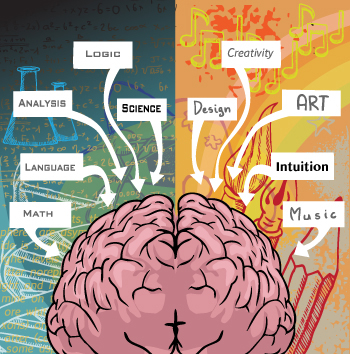Guts and Glory: Intuition and the Science of Behavior
The 19th century author Rudyard Kipling spoke of meeting triumph and disaster and treating both those imposters just the same. Indeed Kipling’s twin imposters both can result from going with one’s gut –following one’s intuitions - in the face of challenging problems and issues in both our personal lives and our lives at work. Intuition often is interjected into conversations about solving problems, but what does it mean?
I begin by noting that some of the best behavioral scientists I know are what would have to be called very intuitive thinkers. But, you may ask, doesn’t intuition fly in the very face of the lessons taught by those same behavioral scientists, with their grounding in "hard data"? Yes and no. It depends in part on what we mean by intuition. As I am using the term, intuition is another word for experience. For a particular history of exposure to circumstances similar to the ones that confront us when intuition is said to take over. All of us have a wealth of problem-solving experience. When confronted with a new problem, that Well of Experience – intuition – is with us for solutions to what confronts us now. Behavioral scientists, like the rest of us, have expertise in their areas of study and application. Drawing on that experience liberally is what makes them good intuitive thinkers. They can apply the knowledge learned in one situation to other, novel situations. They do this not in a literal one-to-one translation from the old situation to the novel one, but allowing for both similarities and differences between the two. My view of intuition raises several issues.

If by intuition we mean experience, does that mean that intuition is not a “gut feeling” about something? Yes and no. It is a gut feeling in the sense that how we act comes from our past experiences and encounters with related circumstances. It is not a gut feeling in the sense that it is paranormal, outside the range of everyday experience: the “voice from the beyond to Andy” stereotype. We learn to call intuitions feelings or sixth senses, but the term really comes down to experience and not some epiphenomenal event that is calling to us from some other universe telling us how to act.
Well, you might say, “everyone has experiences to draw on, so why isn’t everyone a good intuitive thinker?” Good question, I would say. It probably has to do with the fact that individuals attend to things differently – we attend to different aspects of our experiences. Because of my personal history of working with a certain kind of apparatus for graphing behavior in real time, I look at a graph from that device and I see wonderful things: I can construct from the simple graph exactly what the behavior looked like in all of its complexity as it was occurring. A person unfamiliar with the graphing method may look at the graph and see only a squiggly line, nothing interesting. I have been said to have an intuitive feel for the graph, but it is neither magical nor other-worldly. It is in my long history of studying behavior. The same can be said for people who are intuitively good with children, the elderly, people with handicapping conditions, or dogs. Intuition? If you like, but not mysticism. “A woman’s intuition” is legendary in western culture. Read John Gray’s runaway bestseller from the 1990s, Men are from Mars, Women are from Venus to understand how things feminine and things masculine are learned in our society. In life, people see things that others miss not because of some parapsychological trick, but because of differential experiences, both in number and quality. Intuition is a matter of finely distinguishing certain features of our world. Everyone makes distinctions about certain things and not others, and that, plus practice, is the essence of what we call intuition.
Another thing about intuitions is that we sometimes construct them after the fact. How often have you heard someone say after making a bad decision, “Oh, if I had only gone with my gut on that.” It’s certainly possible that the immediate circumstances are compellingly leading to a course of action that is counter to one’s longer-term history. But, it’s also common to say when things go awry, as a way of consoling oneself perhaps, that it did so because it was counter to one’s intuitions. This makes the role of intuition, or lack thereof, in the decision almost impossible to assess, rendering it of little value in accounting for the outcome. Who knows? Following one’s intuitions could have resulted in an even worse outcome!
Intuition as experience may have a role in decision making. As behavioral scientists, however, the term has to be defined clearly and we have to carefully consider the circumstances to determine whether invoking intuition adds anything to understanding problem solving.



